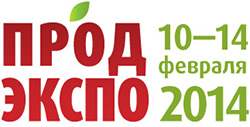February 10-14, 2014
Moscow, Russia
PRODEXPO is the largest annual specialized exhibition in Russia and Eastern Europe. For 20 years, it has determined the development of the domestic food industry.
Over the years of its existence, the PRODEXPO exhibition has played an important role in stimulating the Russian food industry. Promoting high-quality foodstuffs to the domestic market, the PRODEXPO trade show contributes to implementing high-priority federal projects aimed at improving the quality of life of the Russian citizens.
For 20 years, the amount of exhibition space rented and the number of exhibiting companies have increased by five times.
For 20 years, Prodexpo has illustrated:
- the highest quality foodstuffs manufactured by global market leaders;
- innovative food products:
- organic, dietary and functional foods;
- high-tech foods: convenient food, premium fast foods, dehydrated foods, frozen foods, and vacuum packaged foods;
- high-tech equipment for trade and public catering;
- innovative materials, equipment and projects for food packing.
For more information see: www.prod-expo.ru
